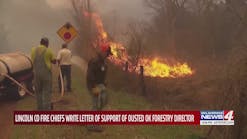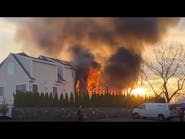Tenn. Captain Warned Mulch Fire Site Was 'Overloaded'
Source The Knoxville News-Sentinel, Tenn.
A report in October from a Knoxville fire captain stated the city-contracted mulch operation Shamrock Organic Products was "overloaded with material," and in April the huge mulch piles there caught fire and burned for a week.
"The captain probably should have called the inspections bureau," said Knoxville Fire Department spokesman DJ Corcoran.
The observation was written in an incident report after firefighters responded to an equipment fire when a bulldozer ignited there in 2011.
Such reports aren't reviewed by fire inspections staff after they're written, according to Corcoran.
"Those are filed away," he said.
The report was gained through a News Sentinel public information request, along with city emails about Shamrock and the city's cost to extinguish the flames, which was more than $200,000 to the fire department and public service department. Police did not incur extra costs to close roads and safely route traffic through the area, including Sutherland Avenue.
Shamrock's owner, Randy Greaves, said he'll file an insurance claim to reimburse the city. As for his business, Greaves said he expects to again accept city-collected debris by the end of the month.
"I am back on my feet, and I'll begin operation very quickly," he said Thursday.
Fighting the blaze
Fire smoldered in the mulch piles at Shamrock for more than a week starting Sunday, April 15. Crews from the fire department worked the scene 24 hours a day and ran up $60,000 in overtime while spraying $38,000 worth of water on the flames at 90,000 gallons an hour.
That's roughly enough to fill an Olympic-sized swimming pool every seven hours.
Some help for the blaze came from McGhee Tyson Airport, which sent crash trucks that could spray and move around piles while Knoxville ladder trucks shot water from above and firefighters trained nozzles from the ground.
A surface foam spray engineered for aviation fires didn't work, but the fire department bought another type of foam to penetrate into the mulch stacked three stories high. That foam cost $13,000 and proved more successful. The fire department's fuel cost to run its pumps, trucks, ladders and equipment was $6,000. Public works crews helped by diverting brush and working overtime, a cost of $83,101.36 to taxpayers.
Greaves' own crews clambered into bulldozers and loaders to push piles apart so that firefighters could spray inside the smoldering masses. Those bulldozers usually work to turn the brush and mulch on the site.
As crews worked, emails sent among city staff show their urgency in finding details, causes and outcomes for the fire.
"Corcoran estimates that the pile did not get turned recently (or on Sunday or maybe several days leading to Sunday) and that's what started the fire," Knoxville Director of Communications Angela Starke wrote to Mayor Madeline Rogero on April 16, relaying a conversation with the fire department's spokesman. "Anything organic in a space is in a constant state of decomposition, but turning it would allow it to cool; otherwise, the pile creates a chemical reaction and generates heat."
Meanwhile, smoke rolled over Knoxville and caused unsafe air quality levels in some neighborhoods. A few gusty days acted like bellows to exacerbate the flames.
As the fire burned, runoff from the nine acre mulch facility began to spill into Third Creek, which drains to Fort Loudoun Lake. Oxygen levels dropped in the creek and water runoff from fire fighting raised temperature enough to kill at least 29 species of fish, according to emails sent among city staff. The fish kill count exceeded 100.
"Fish do not like woodash slurry or chlorinated water," Knoxville Director of Engineering Jim Hagerman wrote in an email to Knoxville Chief Operating Officer Eddie Mannis.
Hagerman explained the kill further in another email.
"Fish and other animals living in water need some level of oxygen dissolved in the water for respiration. Warmer water can hold less dissolved oxygen than cooler water. Biological and chemical processes can consume dissolved oxygen faster than it is replenished from exposure to the atmosphere; any organic material leached from the mulch piles might be consumed by bacteria, and the bacterial respiration would use up the available oxygen."
In another message, Hagerman offered suggestions for Shamrock: "City permits for Shamrock will be re-evaluated; it would be desirable to relocate away from a stream."
City regulations over mulch operations were retooled, and some new ones were added. But it's unlikely that the facility will move. An assessment sheet -- gained through the records request -- rated bidders for the city's mulch contract and gave the most points to Shamrock for being basically in the city's center.
Greaves said he had input on the new rules.
"New codes coming out were suggested by me," Greaves said of making piles smaller and more spread out. There will also be someone on site at Shamrock 24 hours a day to tend the mulch and avoid future fires.
Stumped
After two major storms pounded Knoxville in 2011 and left the city with tons of debris, city staff ramped up hours and production in an attempt to clear the fallen limbs, trunks and stumps. Shamrock had to accept what brush crews brought under its city contract.
The storm debris was twice what Shamrock usually gets in a year, delivered in half the time.
"The only way you can do that is to process it," Greaves said of the volume, "when you're set up to get 25,000 tons, and you get twice that in five months."
He and others called the storms an act of God. And the fire's cause may end up being as mysterious as the heavens.
City fire inspectors have said that they expect their investigations to show the mulch fire's cause to be undetermined. They did rule out acts of God, such as a lightning strike.
"I'm sorry there was a fire," Greaves said. "I hate that there was a fire. But I didn't cause it."
And even though there's no policy requiring inspectors to review reports from fire calls, inspectors have been out to Shamrock numerous times through the years, and as recently as March. Shamrock passed each review.
"I don't think we should be punished for doing our job, within code," Greaves said. "You don't like the codes? Change the codes."
Copyright 2012 - The Knoxville News-Sentinel, Tenn.
McClatchy-Tribune News Service





